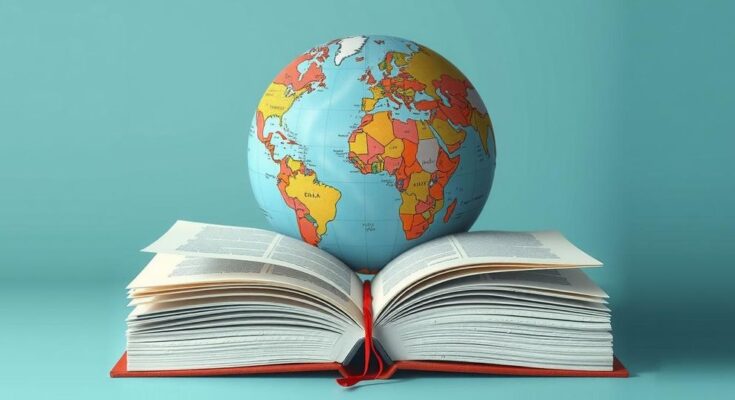Saudi Arabia has begun teaching Mandarin in schools as a compulsory second foreign language, reflecting the deepening ties between Saudi Arabia and China. The initiative aims to diversify the kingdom’s economy and enhance its international alliances. Thousands of students like Yasser al-Shaalan are learning Mandarin, which they see as beneficial for their future careers. The growing economic partnership is further supported through educational exchanges and increased trade relations between the two nations.
In a classroom adorned with a map of China, 14-year-old Yasser al-Shaalan diligently studies professions in a Chinese textbook, part of an initiative where thousands of Saudi children now learn Mandarin. The introduction of Mandarin in schools demonstrates the strengthening relationship between Saudi Arabia and China, as the Gulf kingdom aims to enhance its economy and global partnerships. Shaalan expressed, “I know Arabic, English, and Chinese, which is a great asset for my future,” highlighting the value of multilingualism.
As of August, Saudi Arabia has mandated the teaching of Chinese as a compulsory second foreign language after English in six out of its 13 administrative regions. Yaasser and his classmates attend three Mandarin lessons each week, guided by their instructor, Ma Shuaib, a Chinese national fluent in Arabic. In their northern Riyadh classroom, they engage with Chinese characters on a digital whiteboard, with Shaalan noting, “At first it was difficult, but now it has become easy and fun.” Mandarin, being one of the most spoken global languages, has gained prominence amid increasing ties with China.
After a 2019 visit to China, Crown Prince Mohammed bin Salman initiated plans to incorporate Chinese into the educational system. Consequently, several Saudi universities have launched Chinese programs, including the first branch of the Confucius Institute at Prince Sultan University in 2023. Despite global criticism of Confucius Institutes for potential political motives, there have been no such concerns in Saudi Arabia. Instructor Ma emphasizes modern teaching techniques to facilitate Mandarin learning, despite its complexity.
Currently, though learning Chinese is compulsory, it does not affect overall student grades. Ma outlines his teaching strategy: “At the beginning, we focus on listening, speaking and reading, then we move on to writing.” Sattam al-Otaibi, the school’s director, underscores, “Chinese is the language of the future for economic communication. The world depends on China for many industries.”
As Saudi Arabia expands its international alliances, it maintains a longstanding partnership with the United States while simultaneously strengthening ties with China and Russia. With China receiving a significant portion of Saudi oil exports, it has become the kingdom’s leading trade partner, with bilateral trade surpassing $100 billion in 2023. Crown Prince Mohammed’s “Vision 2030” aims to diversify the economy and reshape international perceptions.
Saudi-China relations have deepened, particularly after China facilitated reconciliation between Saudi Arabia and Iran. Umer Karim, a foreign policy expert, posits, “For Saudi Arabia, the relationship with China has become one of the most important.” Chinese President Xi Jinping has visited Riyadh multiple times and attended summits, fostering economic exchanges, and a Sino-Arab Investment Forum in 2023 resulted in over $10 billion in investments.
As cultural and educational exchanges surge, several Chinese teachers have set foot in Saudi Arabia, with plans for Saudi educators to learn Mandarin in China. The initiative to teach Mandarin reflects the changing global dynamics, with China emerging as a leading economic force.
The introduction of Mandarin in Saudi schools symbolizes the burgeoning relationship between Saudi Arabia and China. With a strategic focus on diversifying its economy, Saudi Arabia recognizes the importance of Chinese as a pivotal language for future economic communication. This educational initiative not only enhances cultural understanding but also positions Saudi youth for future global opportunities, reflecting broader geopolitical shifts.
Original Source: www.mykxlg.com




